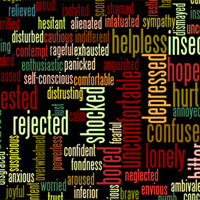Control Your Emotions So Your Abusive Partner Can’t

The last post talked about why losing control of your emotions helps your abusive partner gain control of you. Trust me, I know how challenging it is to keep your composure when the verbal abuser is pushing your buttons! I've lost control of myself more times than I want to count. I've suffered shame after evaluating my reactions to abuse.
Our goal as targets of verbal abuse is to keep our emotions under our control which leads to a clear mind and conscience. There are ways to bring yourself down to earth and respect your emotions without losing respect for yourself. Living with abuse emotionally challenges you, but it doesn’t have to overcome you.
Connect With Your Own Emotions
Before you can pay attention to your emotions, you have to connect with them. Not surprisingly, some abuse victims rarely pay attention to how they feel. A victim's environmental information comes from knowing how their abuser feels so they can act accordingly (avoid abuse). The abuser and the victim place little importance on the victim's feelings, and over time the victim loses touch with them.
 Over the next few days, pay attention to how you're feeling at different points during the day. Pay attention to your heart rate, tension in your body, and thoughts as you name the emotion. When you feel like you can, do this same exercise when your abuser is around. How are your feelings different when you're alone? How are they the same?
Over the next few days, pay attention to how you're feeling at different points during the day. Pay attention to your heart rate, tension in your body, and thoughts as you name the emotion. When you feel like you can, do this same exercise when your abuser is around. How are your feelings different when you're alone? How are they the same?
If you catch yourself imagining what your abuser is feeling, stop yourself by objectively observing them. Instead of thinking, "He's getting upset," think to yourself, "He is pacing and staring at me," or "She is narrowing her eyes at me."
This is important to breaking your abuser's spell over you. They want you to "know" how they feel so you can automatically tend to their desires. Unless it runs in your family, you're no psychic - so stop trying to be one. Pay attention to your emotions and your abuser's actions.
To help you disconnect from your abuser's emotions, stop guessing and start knowing what makes them tick. Read Why Does He Do That?: Inside the Minds of Angry and Controlling Men by Lundy Bancroft or In Sheep's Clothing:Understanding and Dealing With Manipulative People by George K. Simon, PhD.
React to Abuse Appropriately and Safely
You know your abuser better than anyone. Before taking anyone else's suggestions, follow your gut. If you know your abuser is out for real blood, you need to do whatever it is that you do to avoid it (if possible, that avoidance should be leaving the area for somewhere safe!).
Let's say that you're in the middle of a conversation with your abuser when you notice your heart racing. Pause and think about what you were feeling the last time your heart raced. It was probably an anxious moment in which you felt your abuser was setting you up, abusing you with a joke, or you knew something bad was about to happen. You're feeling anxious or fearful.
Take a deep breath and excuse yourself from the conversation. "Excuse me, I have to pee," works pretty well. When you get to the bathroom, congratulate yourself for taking a proactive step to protect yourself. Then, think about what was going on. Why were you anxious? What was your abuser saying and what did they mean to do with your reaction to it? Your perception is the correct one, and you should take a moment to decide how you're going to deal with it before you leave the bathroom.
Maybe the next time your abuser begins their act, it won't take you long to recognize how you're feeling. You could say something like, "Did I just hear you say that you think I am (a moron, incompetent, lazy,...)?" If your abuser denies saying that, just say, "Okay. Just checking." If your abuser says, "Yes, you heard me right!" then you can say, "I disagree with that, and I won't stand here and let you insult me," then walk away.
At this point you're ready to create some boundaries. You're also ready to read Patricia Evans' book The Verbally Abusive Relationship: How to recognize it and how to respond to learn more advanced response techniques.
Give Your Pain Somewhere To Go
If all of that sounds like you're going to need to have the willpower of a saint, you're close to correct. It is TOUGH to take a pause and think about how to react when an emotion hits you hard. How to Keep People From Pushing Your Buttons by Alpert Ellis is an excellent resource for learning more about keeping your abuser's words at bay.
However, initially, you're probably going to want to cry or yell or do whatever you usually do when your abuser acts out. Habits are tough to break! But reacting the same way you always have will give you the same results you always get.
Instead of escalating the cycle of abuse by giving your abuser what they want (they want you to lose control of yourself), be calm, cool and collected in your abuser's presence. (Think Uma Thurman in Kill Bill or Clint Eastwood in practically any move he's ever done.)
But when you get a moment to yourself, give your pain somewhere to go. You could:
- write out what happened, how you reacted and how it felt, how you wanted to react, how you will react the next time.
- make a video or voice recording with the same information as above
- call a friend and tell them not only what happened, but how you reacted and how it felt, etc.
- doodle or draw a picture about the event
- dance it out
The last thing you want to do is internalize the pain. Don't keep it to yourself because it will sit there, waiting for the next time you're abused to pounce out of you without your permission. Finally, remember to give yourself a break if you screw up. Learning any new skill takes practice, so be patient and keep practicing!
You can find Kellie Jo Holly at Verbal Abuse Journals, or social media on Google+, Facebook, Twitter and Amazon Authors.
*Both women and men could be abusers or victims, so do not take my pronoun choices as an implication that one gender abuses and the other is victimized.
APA Reference
Jo, K.
(2012, July 23). Control Your Emotions So Your Abusive Partner Can’t, HealthyPlace. Retrieved
on 2026, January 12 from https://www.healthyplace.com/blogs/verbalabuseinrelationships/2012/07/control-your-emotions-so-abusive-partner-cant
Author: Kellie Jo Holly
Thank-you, I am trying to leave a verbally abusive relationship and finding it difficult. This article has given me the tools to change the dynamic and in turn I think this will start to make me feel more empowered. I am scared he will just resort to even more abuse though. I live in constant anxiety.
Hey Kris, I completely understand your fear, but you hit the nail on the head--getting empowered. Dealing with abuse starts with the self. It starts by realizing there is a problem and that the problem isn’t you. I know it can feel impossible at times, but there is always a safe way out. Definitely read through the resources posted above, and if you ever feel physically threatened, please don’t hesitate to reach out for more help: https://www.healthyplace.com/other-info/resources/mental-health-hotline-numbers-and-refer…
Love and light-Jenn
This helped me / I need to memorize it am do it so it becomes second nature / I'm in a very bad situation / it's no only the verbal ,an emotional, it's financial, it's food ,it is health ,I've had two operations this year an still need at least one more / it's my dog ,he won't let me drive ,he controls everything, I need help an I'm having a terrible time finding any at all
Thanks to this article, my wife will have to try harder to tear me down, because I will not be so reactive. It's tough to realize you're in an abusive relationship sometimes, but once that realization comes, you can take positive steps. My positive step is to value myself more.
Thankyou for giving me the tools to cope and change. I'm staying in a verbally abusive marriage for 28 years now, and this article gave me concrete insight on how to react or better said not react . I will keep saying to myself" by losing control he gains control" thankyou
Really great advice. I've been out of my abusive relationship for 8 years and I still struggle. Thank you so much!
Thanks Kelly, this had been a real help. From now
on, no more bullshit from my husband!
Thanks!!!!
So glad I have found your site. From now on I'll
be in charge of me and this site will help me to
leave my abusive husband.
Thank you!!!!
Love,
Maggie

